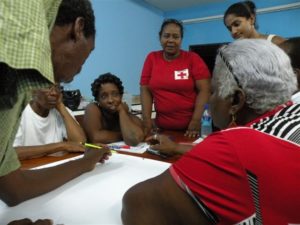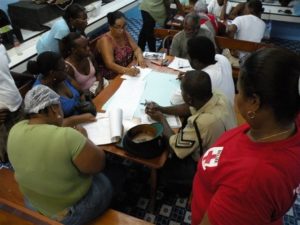Alex Agosti is the Regional Manager for Latin America and Caribbean Programs in the American Red Cross International Services Department.
Imagine a storm so devastating that it would cause a country to move its capital city and you get a sense of the impact that Hurricane Hattie had on Belize in 1961. One of the most powerful storms in the history of the Central American country, the Category 5 hurricane killed 300 and left tens of thousands homeless, prompting the decision to move the capital city to Belmopan, some 50 miles inland.

Many of those whose homes were destroyed by Hattie were relocated 17 miles outside of Belize City to a new settlement named Hattieville. More than 50 years later, the Red Cross is working with the next generation of Hattieville residents, along with members of 13 other communities in Belize, to share important disaster preparedness skills and to build more resilient communities.
The project, called “Saving Lives in the Caribbean through Disaster Preparedness,” is a partnership of the American Red Cross, the Belize Red Cross and the global Red Cross network with funding support from the United States Agency for International Development’s Office of Foreign Disaster Assistance (USAID/OFDA).
In mid-June, our team travelled to Belize to work with the Belize Red Cross on the Saving Lives program. Our visit took us to villages from Caye Caulker, one of the many islands that dot the Caribbean just off the Belizean coast, to Hattieville. We joined residents as they gathered for part of the introductory phase of the two-year program. It’s called the Vulnerability and Capacity Assessment (VCA), a process that engages the community in identifying the threats and risks they face and the skills and resources they have to respond to them.

The disaster preparedness program seeks to benefit more than 75,000 people as it helps to build more resilient communities and Red Cross societies in Belize, the Bahamas and St. Lucia through a number of initiatives, among them:
- training community members in First Aid
- conducting an in-depth analysis of the community’s vulnerabilities and resources (VCA)
- forming and training Community Disaster Response Teams (CDRTs), who are often the first to respond to local disasters, in assessments, coordination, light search and rescue, fire safety, psychosocial support, relief distribution and shelter management
- educating community on disaster preparedness and risk reduction, creating community disaster response plans and conducting simulation exercises to test plans and CDRT skills
- implementing disaster mitigation projects like constructing drainage ditches to prevent flooding and strengthening hurricane shelters.
The experienced Belize Red Cross team, works hard every day (and many nights!) to better prepare communities in a country that knows all too well the threats that lie ahead in hurricane season.
“The history of Hattieville is a constant reminder of the importance of our work, and the people of Hattieville and so many other Belizean communities are a constant source of inspiration,” Lily Bowman, Director General of the Belize Red Cross said. “We are grateful to the American Red Cross and USAID/OFDA for this powerful partnership.”
